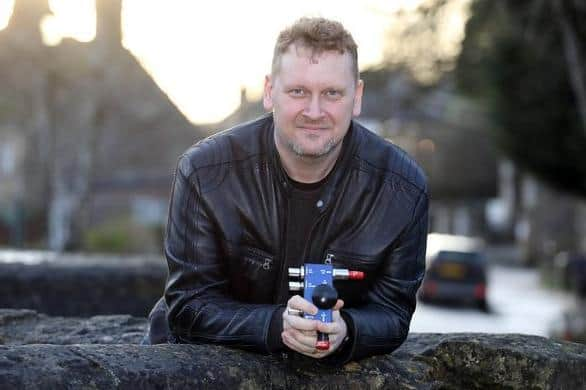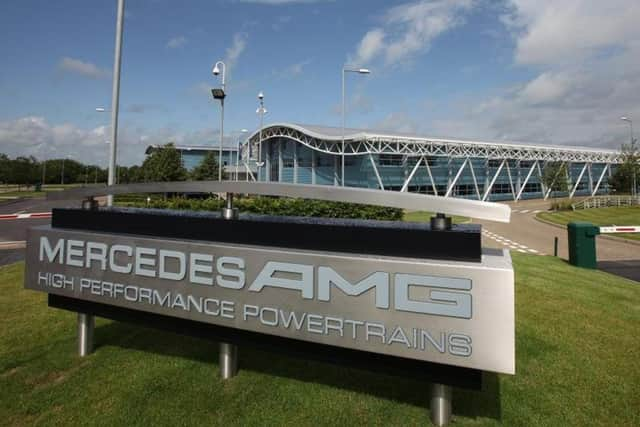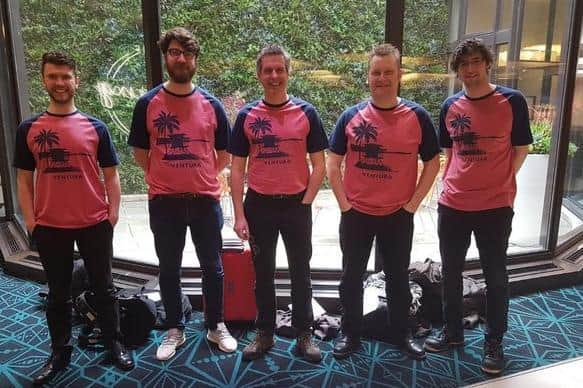Queen honours Mercedes F1 engineer who created Covid life-saver at Brixworth factory
and live on Freeview channel 276
March 2020 was a month like no other for Ben Hodgkinson.
As head of mechanical engineering at Mercedes AMG HPP based at Brixworth, he was looking forward to the start of the Formula One season. Then Covid-19 hit and he quickly had to hit top speed in something completely different when the racing season was postponed.
With hospitals filling up fast, and with fears that the NHS would run out of ventilators, he worked night and day to create a new continuous positive airway pressure (CPAP) device.


Advertisement
Hide AdAdvertisement
Hide AdIn just 10 days the project was complete and the device created by Ben and his team would save thousands of lives around the world.
Ben has now been awarded a British Empire Medal (BEM) for services to the NHS in the New Year Honours list yet the modest 46-year-old insists he was just 'doing his duty'.
He told the this newspaper: "I am proud that I did it but I also do not feel as worthy as some. What I did was work incredibly hard for about three weeks.
"There are doctors and nurses who have been working in these conditions, day and night, for months and months.


Advertisement
Hide AdAdvertisement
Hide Ad"I helped as much as I possibly could and it was something that I knew how to do. It was just my duty."
Ben has a long-standing relationship with University College London (UCL), occasionally teaching engineering there. In the early stages of the pandemic University College Hospital (UCH) in London contacted the university's Professor Tim Baker, who gave Ben an early break in his racing career, asking if he could help with the Government's ventilation challenge.
UCH believed that creating ventilators was not the right way forward. They felt a CPAP — a device which delivers a flow of oxygen-enriched air at a constant pressure and is connected to a mask or hood — was the best way having seen how hard Covid had hit Italy.
On a ventilator patients have to be looked after by an intensive care nurse, who can only look after one or two patients at a time. On a CPAP, however, patients can be looked after by a regular nurse caring for 10 patients.


Advertisement
Hide AdAdvertisement
Hide AdBut there was one big problem: The UK didn't have many CPAPs available. A 25-year-old model was dug out from the UCH museum and they needed someone who could 'reverse engineer' it ... work out how it was made and reproduce it. And quickly.
Prof Baker knew just the man and contacted Ben, who got permission from his Mercedes bosses to take on the task and picked his best engineers to help him.
Ben, who lives in Geddington, said: "In my head I had it (the device) looking like something off Wallace and Gromit.
"It turned out to be quite a small plastic block with three valves and I took it back to the labs at UCL and worked out how it worked pretty quickly."
Advertisement
Hide AdAdvertisement
Hide AdAfter a few gruelling days, working until 6am and having just two hours sleep before starting again, they finished the design of their new Mark II UCL-Ventura device. Not only did they reproduce it but they made it better by altering the computational dynamics to reduce the amount of oxygen it used - crucial at a time when there were also worries about the NHS's oxygen supply.
Within 10 days of starting the project was complete. A prototype was made, it was tested on a clinician, approved in rapid time by the Medicines and Healthcare products Regulatory Agency and production began.
Ben said: "I've worked in Formula One for 20 years. You're pushed hard and it's quite stressful but you have this mental retreat that it's only racing, it's not life or death.
"But this was life or death. The few hours sleep I stole I felt guilty about. I just felt terrible leaving each morning."
Advertisement
Hide AdAdvertisement
Hide AdThe Government quickly made an order for up to 10,000 devices. Using the Mercedes factory in Brixworth, which was completely repurposed, they made 1,000 a day to fill the order with workers even packaging them in the factory's restaurant area.
And, at no cost, the design was selflessly released so it could be produced around the world. Within one week designs had been shared with more than 1,300 teams in 25 countries and have since helped healthcare staff in more than 90 countries. India needed thousands of CPAPs when they were hit by a devastating Covid wave earlier this year.
The designs were even downloaded by Nasa, much to Ben's surprise.
He said: "As an engineer we always joke and say 'it's not rocket science'. Then, all of a sudden, Nasa download your designs and you think, maybe it is?"
Advertisement
Hide AdAdvertisement
Hide AdBen, who has since left Mercedes after signing a deal to become technical director at F1 rivals Red Bull Powertrains, said the hairs on the back of his neck stand up when he hears of the impact his work has had.
He himself caught Covid at the end of March 2020, which he believes must have been during his work on the project, and was 'out for the count' for two weeks.
He said: "Fortunately I didn't need one of my own devices but while I was in bed, I kept being sent videos of them being used. It was very emotional."
He learned he was on the honours list when he received a letter from the Cabinet Office, despite originally missing it.
Having not looked in the letterbox it was found by his wife, but Ben was sworn to secrecy and didn't even tell his mum.
He said: "It was completely unexpected. It's a hell of a thing."